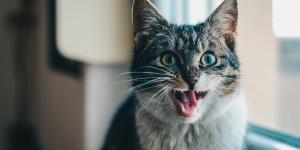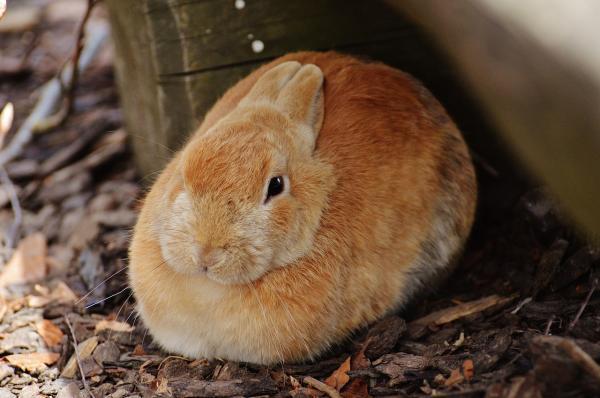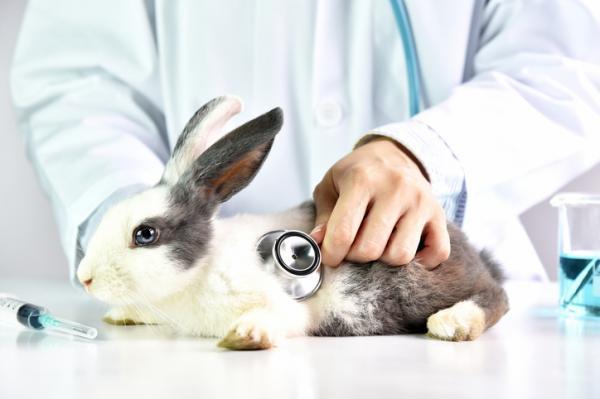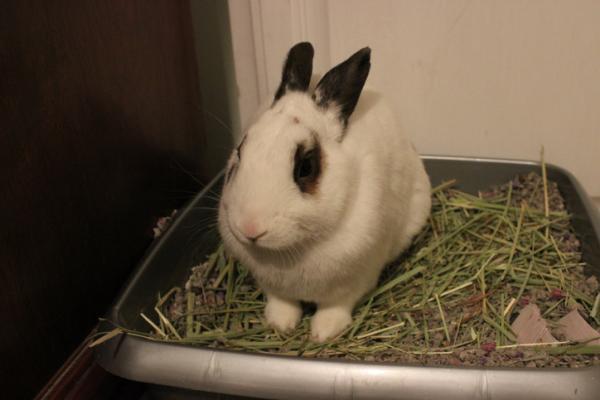My Rabbit's Stomach is Making Gurgling Sounds



See files for Rabbits
Digestive problems are some of the most frequent health issues in domestic rabbits. This is because there are so many factors which can compromise their gastrointestinal health. As sensitive animals, changes to their environment, diet or any aspect of their care can lead to various symptoms. Even psychological issues can result in gastrointestinal problems. What they eat is particularly important, which is why it is vital guardians learn everything they can about the needs of rabbits before adopting.
In this AnimalWised article, we discuss the reasons why your rabbit's stomach is making gurgling sounds. A certain amount of gas is to be expected for your rabbit, but if your bunny has bloat, it could mean there is a more severe problem. Keep reading to find out more.
The digestive system of rabbits
To understand why a rabbit's stomach and intestines make gurgling sounds, we need to understand how their gastrointestinal system works. This system begins in the mouth, continues via the esophagus into the stomach, small intestine, large intestine, the cecum, the rectum and, finally, exits through the anus. Additionally, the salivary glands, liver, kidneys and pancreas are also vital parts of the rabbit digestive system.
While these components are common to many rabbit species, the rabbit has its own features which are more distinct. These include large incisors which are very sharp, necessary for cutting the tough grasses on which they feed. They also have molars and premolars to break down this fibrous food, moving from side to side to do so. The teeth of rabbits grow continuously throughout their lives. Abnormal teeth growth is something rabbit guardians need to regularly monitor.
After being chewed in the mouth, food reaches the monocavitary stomach and continues its journey to the intestines, where fermentation takes place. Rabbits carry out something known as hindgut fermentation, meaning the digestion takes place mainly in the large intestine and cecum. It is necessary to break down the large amount of cellulose in their diet.
Due to their fermentation, rabbits create two different types of feces. One is considered normal waste and consists mainly of non-fermentable fiber. The other is produced in the form of cecotropes. Cecotropes are a type of feces produced in the cecum which are softer and packed together. They are very important because they contain vital gut flora for good gastronintestinal transit. Cecotropes are usually eliminated at night and it is very important they are ingested, which usually occurs almost immediately. For this reason, the majority of rabbit droppings we find will be the normal fecal matter.
Rabbit diet
The diet of a rabbit must mainly be composed of:
- Hay: hay provides them with the fiber they need for correct intestinal transit. Their diet will be made up of 80% hay.
- Rabbit feed: the specific feed for rabbits will represent approximately 10-15% of the diet and usually comes in the form of pellets.
- Fruit and vegetables: the remaining 5-10% is reserved for fresh vegetables and fruit. Not all are beneficial, only fruit and vegetables recommended for rabbits should be provided.
Of course, permanent access to clean and fresh water is essential. Dehydration in rabbits is a significant problem and can lead to many severe health issues.
Brushing rabbits
Finally, keep in mind that rabbits self-groom in a manner similar to cats. That is why it is advisable to brush them frequently. This should be performed daily during the molting season, so that they do not ingest an excessive amount of hair that could lead to gastrointestinal disorders This is especially important in individuals that do not consume enough hay and long-haired rabbits.
Source: Pinterest
Gastrointestinal stasis or paralytic ileus in rabbits (bloat)
When rabbits have trapped air in their digestive system, they cannot eliminate it in the same way as some other mammals. This causes the abdomen to inflate and the rabbit to stop eating. They will also have trouble defecating, either only producing a small amount of feces or none at all. The rabbit may also become severely dehydrated if they are unable to drink water.
Trapped air can result in gastrointestinal stasis, although this is not the only cause. It is a relatively common occurrence in rabbits, but it is also life threatening. This is because the rabbit is unable to eat. If this happens for longer than 24 hours, it is considered an emergency. It is also known as paralytic ileus as the intestines can no longer propel food through the GI tract.
Causes of gastrointestinal stasis or paralytic ileus
The most common causes of this type of hypomotility are:
- Inadequate diet
- Excessive carbohydrate consumption
- Lack of fiber
- Intake of toxic material
- Lack of exercise
- Pain
- Psychological stress
In the next section we will look closer into intestinal obstructions in rabbits, something often referred to as bloat. If your rabbit's guts are making a gurgling sound, it is important to call the veterinarian if it persists.
Treatment of gastrointestinal stasis or paralytic ileus
To try to resolve the intestinal stasis, you will have ti go to a veterinarian to determine the cause. Treating the problem without knowing the cause can speed the problem and result in a faster death. The vet will be able to perform diagnostic tests, usually beginning with an x-ray or ultrasound. Initial support will involve providing liquid food using a syringe or feeding tube. If there is no obstruction, prokinetics will likely be used to resume digestive motility.
Fluid therapy, antibiotics, gastric protectors, analgesics, anti-inflammatories, drugs to eliminate gas or even malt paste may be administered, depending on the cause and severity of the problem. Additionally, care may be supplemented by performing massages and encouraging mild exercise. It should be noted that a lack of response to treatment will likely require surgical intervention.
Digestive stasis in rabbits means the rabbit does not defecate, but it is not necessarily the same as constipation in rabbits.

Bloat in rabbits (intestinal obstruction)
Obstructions in rabbits occur when a blockage forms that prevents normal intestinal transit. It is informally often referred to as bloat. Some may refer to the above stasis as bloat if it results in swelling of the abdomen, but normally it refers to an obstruction.
The causes of such obstruction are varied. It commonly occurs when the rabbit does not ingest sufficient amounts of hay. Fiber in hay is necessary to eliminate any element which pass into the digestive system, including hairs and other non-food items. Foreign objects, although less frequent than dogs or cats, may be ingested and cause obstruction. Other causes of bloat in rabbits include inflammation, tumors or dehydration of gastric content.
Symptoms of intestinal obstruction in rabbits
Affected animals, in addition to gurgling sounds in their stomach, may also display:
- Pain
- Shivering due to cold
- Appetite loss
- Increased heart rate
Treatment of intestinal obstruction in rabbits
The vet can confirm the diagnosis by performing a blood test. If glucose levels are high, it is an obstruction and surgical intervention will be required. It is a complex intervention with possible complications. Therefore, to avoid this problem, it is important to provide the rabbit with adequate food, brush them regularly and avoid leaving anything inappropriate they might ingest.
Trichobezoar in rabbits refers to the scientific term for collected hair in the digestive system. While cats normally expel them fairly easily, bunnies have great trouble doing so. This is why intervention is often required.
Bacterial enteritis in rabbits
The main symptom of enteritis is loose stools. If your rabbit has diarrhea, you will be able to tell by the presence of liquid feces stuck to the rabbit's rear. They may also be dehydrated, although this will be more difficult to observe. There are several causes of rabbit enteritis including:
- Dietary changes
- Carbohydrate rich diet
- Bacterial growth in the GI tract
- Side-effects of certain medication (e.g. antibiotics)
- Stress
- Intestinal parasites (e.g. coccidia in rabbits)
Parasites are causes of some of the most common diseases in rabbits. The upset to the digestive system causes diarrhea and poor elimination, also resulting in gurgling noises. Such gurgling noises are an indicator of the problem, although it is important to distinguish these from normal digestive sounds.
If your bunny's stomach is gurgling persistently and you observe diarrhea, it is likely enteritis. In these cases, it is essential you go to the veterinarian.
Treatment of bacterial enteritis in rabbits
In mild cases of rabbit enteritis, they can usually be resolved with the administration of oral antibiotics. This will usually be given with a concurrent prescription high-fiber diet and, if necessary, pain relievers. If the rabbit is dehydrated, fluid therapy may also be administered. Additionally, if there is no response to treatment, there is the possibility of transplanting feces from a healthy rabbit into the patient.
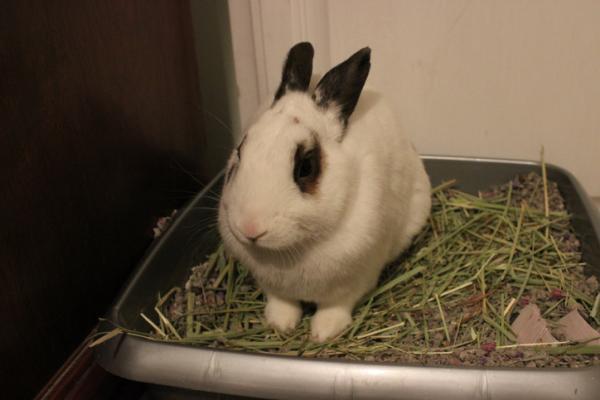
Conclusion
In summary, if we hear that our rabbit has persistent gurgling sounds in their stomach, it is vital we take them to a veterinarian. Only they will be able to determine an accurate diagnosis and course of treatment. However, prevention is always better than cure and providing the right level of care when raising our rabbits is vital. This means giving them the correct diet, hygienic treatment (including regular cleaning of their hutch to avoid bacteria) and general observation.
If you want to know more about basic rabbit care, we share this helpful video below:

This article is purely informative. AnimalWised does not have the authority to prescribe any veterinary treatment or create a diagnosis. We invite you to take your pet to the veterinarian if they are suffering from any condition or pain.
If you want to read similar articles to My Rabbit's Stomach is Making Gurgling Sounds, we recommend you visit our Other health problems category.
- Teso, Be., & Barbero, S. (2017). Gastrointestinal pathologies in lagomorphs. Ateuves, 48, 28-34.


